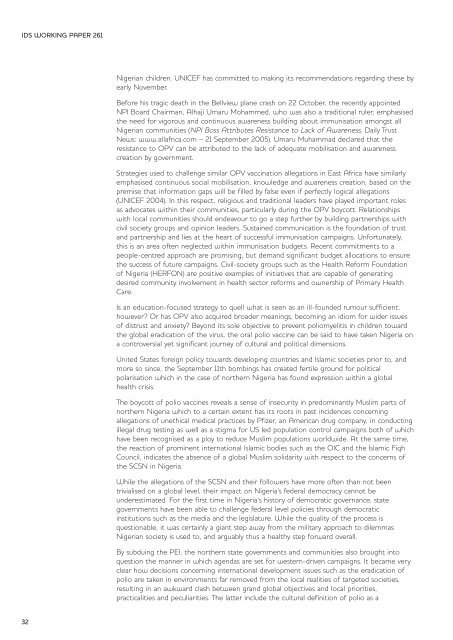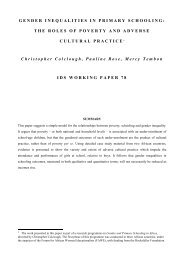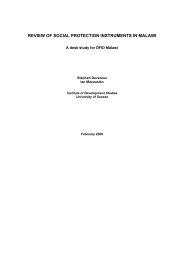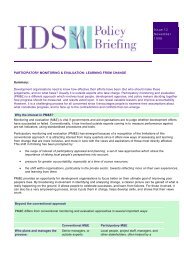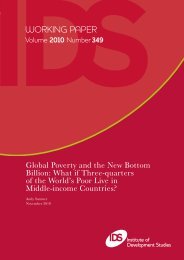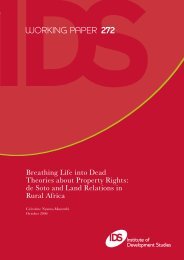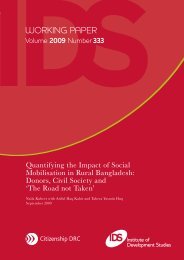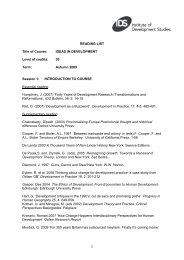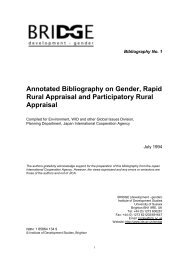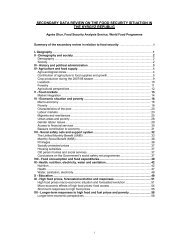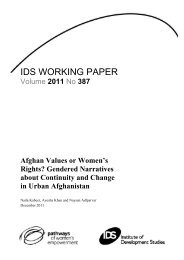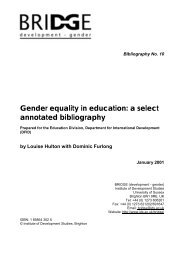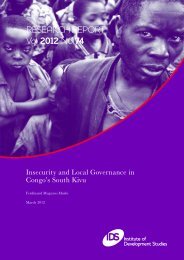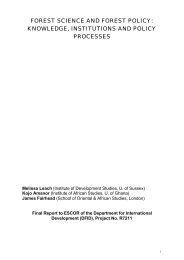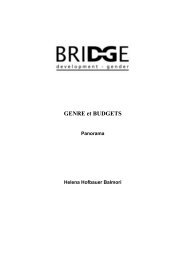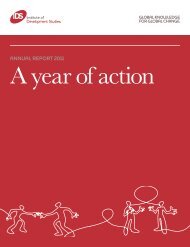WORKING PAPER 261 - Institute of Development Studies
WORKING PAPER 261 - Institute of Development Studies
WORKING PAPER 261 - Institute of Development Studies
Create successful ePaper yourself
Turn your PDF publications into a flip-book with our unique Google optimized e-Paper software.
IDS <strong>WORKING</strong> <strong>PAPER</strong> <strong>261</strong><br />
Nigerian children. UNICEF has committed to making its recommendations regarding these by<br />
early November.<br />
Before his tragic death in the Bellview plane crash on 22 October, the recently appointed<br />
NPI Board Chairman, Alhaji Umaru Mohammed, who was also a traditional ruler, emphasised<br />
the need for vigorous and continuous awareness building about immunisation amongst all<br />
Nigerian communities (NPI Boss Attributes Resistance to Lack <strong>of</strong> Awareness, Daily Trust<br />
News: www.allafrica.com – 21 September 2005). Umaru Muhammad declared that the<br />
resistance to OPV can be attributed to the lack <strong>of</strong> adequate mobilisation and awareness<br />
creation by government.<br />
Strategies used to challenge similar OPV vaccination allegations in East Africa have similarly<br />
emphasised continuous social mobilisation, knowledge and awareness creation, based on the<br />
premise that information gaps will be filled by false even if perfectly logical allegations<br />
(UNICEF 2004). In this respect, religious and traditional leaders have played important roles<br />
as advocates within their communities, particularly during the OPV boycott. Relationships<br />
with local communities should endeavour to go a step further by building partnerships with<br />
civil society groups and opinion leaders. Sustained communication is the foundation <strong>of</strong> trust<br />
and partnership and lies at the heart <strong>of</strong> successful immunisation campaigns. Unfortunately,<br />
this is an area <strong>of</strong>ten neglected within immunisation budgets. Recent commitments to a<br />
people-centred approach are promising, but demand significant budget allocations to ensure<br />
the success <strong>of</strong> future campaigns. Civil-society groups such as the Health Reform Foundation<br />
<strong>of</strong> Nigeria (HERFON) are positive examples <strong>of</strong> initiatives that are capable <strong>of</strong> generating<br />
desired community involvement in health sector reforms and ownership <strong>of</strong> Primary Health<br />
Care.<br />
Is an education-focused strategy to quell what is seen as an ill-founded rumour sufficient,<br />
however Or has OPV also acquired broader meanings, becoming an idiom for wider issues<br />
<strong>of</strong> distrust and anxiety Beyond its sole objective to prevent poliomyelitis in children toward<br />
the global eradication <strong>of</strong> the virus, the oral polio vaccine can be said to have taken Nigeria on<br />
a controversial yet significant journey <strong>of</strong> cultural and political dimensions.<br />
United States foreign policy towards developing countries and Islamic societies prior to, and<br />
more so since, the September 11th bombings has created fertile ground for political<br />
polarisation which in the case <strong>of</strong> northern Nigeria has found expression within a global<br />
health crisis.<br />
The boycott <strong>of</strong> polio vaccines reveals a sense <strong>of</strong> insecurity in predominantly Muslim parts <strong>of</strong><br />
northern Nigeria which to a certain extent has its roots in past incidences concerning<br />
allegations <strong>of</strong> unethical medical practices by Pfizer, an American drug company, in conducting<br />
illegal drug testing as well as a stigma for US led population control campaigns both <strong>of</strong> which<br />
have been recognised as a ploy to reduce Muslim populations worldwide. At the same time,<br />
the reaction <strong>of</strong> prominent international Islamic bodies such as the OIC and the Islamic Fiqh<br />
Council, indicates the absence <strong>of</strong> a global Muslim solidarity with respect to the concerns <strong>of</strong><br />
the SCSN in Nigeria.<br />
While the allegations <strong>of</strong> the SCSN and their followers have more <strong>of</strong>ten than not been<br />
trivialised on a global level, their impact on Nigeria’s federal democracy cannot be<br />
underestimated. For the first time in Nigeria’s history <strong>of</strong> democratic governance, state<br />
governments have been able to challenge federal level policies through democratic<br />
institutions such as the media and the legislature. While the quality <strong>of</strong> the process is<br />
questionable, it was certainly a giant step away from the military approach to dilemmas<br />
Nigerian society is used to, and arguably thus a healthy step forward overall.<br />
By subduing the PEI, the northern state governments and communities also brought into<br />
question the manner in which agendas are set for western-driven campaigns. It became very<br />
clear how decisions concerning international development issues such as the eradication <strong>of</strong><br />
polio are taken in environments far removed from the local realities <strong>of</strong> targeted societies,<br />
resulting in an awkward clash between grand global objectives and local priorities,<br />
practicalities and peculiarities. The latter include the cultural definition <strong>of</strong> polio as a<br />
32


